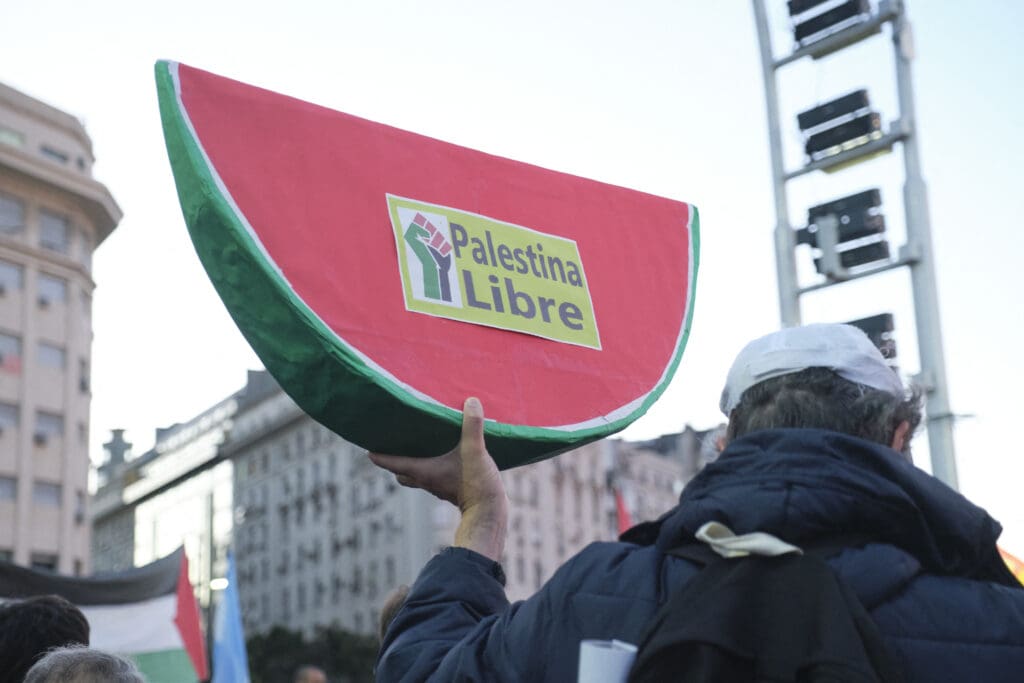Amid the ongoing humanitarian catastrophe in Gaza, several Latin American governments, such as Belize, Bolivia, Brazil, Colombia, Cuba, Honduras, Nicaragua and Chile, have emerged as leading supporters of the Palestinian struggle and prominent critics of Israeli policy. In response to what some of them consider as a genocidal campaign in Gaza, these governments have severed diplomatic ties with Israel, suspended or restricted bilateral trade, promoted multilateral initiatives aimed at alleviating Palestinian suffering, and recently condemned the Netanyahu government’s plans to “occupy” Gaza City. From a global perspective, Latin America is home to some of the most vocal opposition to the colonization, dispossession, displacement and massive killings taking place in Palestine, which has placed the region at the forefront of global solidarity with the Palestinian cause.
At first, the position of states like Cuba, Venezuela and Nicaragua may not be surprising, as Palestine became one of the references for leftist movements’ anti-imperialist stance throughout the Cold War. Since they are led today by leftist governments, along with those in Bolivia, Colombia, Mexico and Chile, it is tempting to view current critiques of Israel as simply the latest manifestations of Latin American anti-imperialism—one that has historically regarded the Palestinian struggle as part of the broader project of Third World liberation.
Some specific cases seem to support this view. For instance, in March 2024, Cuban President Miguel Díaz-Canel led a public demonstration in support of Palestine in Havana. The demonstration took place at the “José Martí Anti-Imperialist Platform,” named after Cuba’s 19th-century liberator and constructed during the dispute with the United States over the custody of then 6-year-old Elián González in 2000. Surrounded by plaques honoring Karl Marx, Malcolm X and Martin Luther King Jr., Díaz-Canel wore a Palestinian kufiyah and a t-shirt featuring the iconic face of Che Guevara.
Similar to Cuba, in countries such as Nicaragua and Venezuela, solidarity with Palestine is currently being framed within the broader context of anti-imperialist struggles. However, it is reductive to view the Latin American left’s current critique of Israel as merely a continuation of Cold War–era anti-imperialism. Recent political shifts—driven by social movements demanding justice for past state crimes—have redefined how some governments engage internationally. In several countries, leftist movements have come to power for the first time; in others, they have returned with renewed agendas centered on achieving truth and justice for past abuses. These efforts often confront the legacy of state repression linked to the post-9/11 wave of punitive populism, in which governments used “war on terror” rhetoric to justify militarized crackdowns on dissidents and the general population. As Mexican scholar Silvana Rabinovich has emphasized, repression in Latin America has disproportionately targeted indigenous populations, who—like Palestinians—have long been subjected to colonial violence.
Due to its prominent role in Latin America’s security apparatuses and military cooperation during that period, Israel is increasingly viewed as complicit in the region’s repressive past. This historical association underpins the solidarity of Latin America’s new left towards Palestine, which becomes then part of a broader struggle against state repression and the racialized security rhetoric that sustains it.
Mexico is one such case. Since 2006, when then-President Felipe Calderón launched the so-called “war on drugs,” the country experienced a wave of illegal detentions, killings, disappearances and torture—carried out in the name of combating drug cartels. In this context, Israel supplied successive Mexican governments with repressive technologies—most notably the Pegasus surveillance spyware—and also become a refuge for former officials accused of participating in this repressive legacy. A prominent example is former head of Criminal Investigation Agency Tomás Zerón de Lucio, who faces charges of torture during investigations into the forced disappearance of 43 students in 2014.
While Mexico’s return to leftist governance in 2018 under Andrés Manuel López Obrador did not immediately produce a change in foreign policy regarding Israel—even under strong public pressure to support the Palestinian cause before October 7, 2023—a notable shift came in 2024 with the rise to power of Claudia Sheinbaum, López Obrador’s successor. Immediately, Sheinbaum vocally criticized Israeli policy toward Palestinians and Mexico joined South Africa’s case against Israel at the International Court of Justice (ICJ) alleging genocide in Gaza.
Similarly, in 2019, massive popular protests in Chile—home to the largest Palestinian diaspora outside the Arab world—challenged a repressive state apparatus with roots in the U.S.-backed dictatorship of Augusto Pinochet. These protests were followed by the election of young, leftist politician Gabriel Boric in the 2021 presidential election. His victory marked an attempt to open a new chapter in the country’s history.
Boric’s discourse of political renewal extended to Chile’s foreign policy, including its relationship with Israel—one of the main arms suppliers to Chile’s military junta between 1973 and 1990. In 2024, after denouncing the genocide in Gaza, Chile joined South Africa’s case at the ICJ. The government also withdrew its military attachés from its embassy in Tel Aviv, barred Israeli companies from participating in a major defense expo in its capital Santiago, and announced its support for an arms embargo—all of which encompassed a major shift in Chile’s approach to Israel.
A comparable change took place in Bolivia following Jeanine Áñez’s military-backed coup against President Evo Morales and his Movement Toward Socialism (MAS) party in late-2019. Shortly after, she restored relations with Israel that Morales had cut in 2009—in response to the military operation Cast Lead in Gaza—and sought Israeli assistance in training police units for counterterrorism, using the state’s security apparatus to repress opposition and target former MAS officials. As journalist Belén Fernández wrote, the coup was not only for Bolivia’s rightwing but “for Israel too.”
Yet when elections were held in Bolivia in October 2020, MAS candidate Luis Arce won a landslide victory. One of his first actions was to reinstate visa requirements for Israeli citizens due to lack of reciprocity. In late 2023, Bolivia broke diplomatic ties with Israel, condemning what it described as a “disproportionate military offensive in the Gaza Strip.” A year later, the country also joined South Africa’s case at the ICJ. However, following MAS’s defeat in the first round of presidential elections in August 2025, it remains uncertain whether the country will keep its critical stance toward Israel in the future.
Considering recent developments in Latin America and the positions some governments have adopted toward Israel/Palestine, the most significant shift arguably comes from Colombia, where state violence has left deep marks across all sectors of society. During his 2002–2010 presidency, Álvaro Uribe adopted the “Democratic Security” policy modeled around the post-9/11 “war on terror” to combat Colombia’s armed insurgent groups. In practice, this policy led to a period of intensified violence and serious human rights violations, carried out in the name of restoring security and reestablishing state control across Colombian territory. Uribe’s security agenda benefited from longstanding military ties with Israel. For example, Colombia had previously acquired several Israeli Kfir fighter jets, whose maintenance was, until recently, handled by Israeli companies. Some observers—either critically or approvingly—have even referred to Colombia as “the Israel of Latin America.”
In August 2022, Colombia elected its first left-wing government in recent history, led by Gustavo Petro, whose administration adopted a critical stance on past state violence and set the stage for the criminal conviction of Uribe. This break with the past extended to foreign policy, particularly toward the Middle East. After October 7, Petro refused to condemn Hamas and criticized genocidal statements made by Israeli officials, leading to a breakdown in economic relations and, eventually, the severing of diplomatic ties in May 2024. Colombia also joined South Africa’s case at the ICJ and, in January 2025, became a founding member of the Hague Group—a vanguard of states seeking accountability for Israel’s violations of international law. Bogota hosted the coalition’s first emergency summit in July.
Despite regional changes, it remains to be seen whether Latin America’s leftist governments will resist reproducing the repressive patterns of the past. However, as the previous cases make clear, Latin America’s solidarity with Palestine—and its critique of Israel’s ongoing genocide in Gaza—cannot be dismissed as mere populist posturing. Rather it reflects a deeper political alignment rooted in the region’s own struggles against state violence, impunity and abuses carried out in the name of security, for which Israel played a key role. Therefore, the struggles to attain truth and justice in Latin America see the Palestinian question as their own. This motivates those governments, which recently came to power as a consequence of these struggles, to openly join in solidarity with all forms of Palestinian resistance. This affinity is not nostalgia for a bygone past, but a transnational identification with shared struggles against injustice and repression that gives rise to the Global South.


